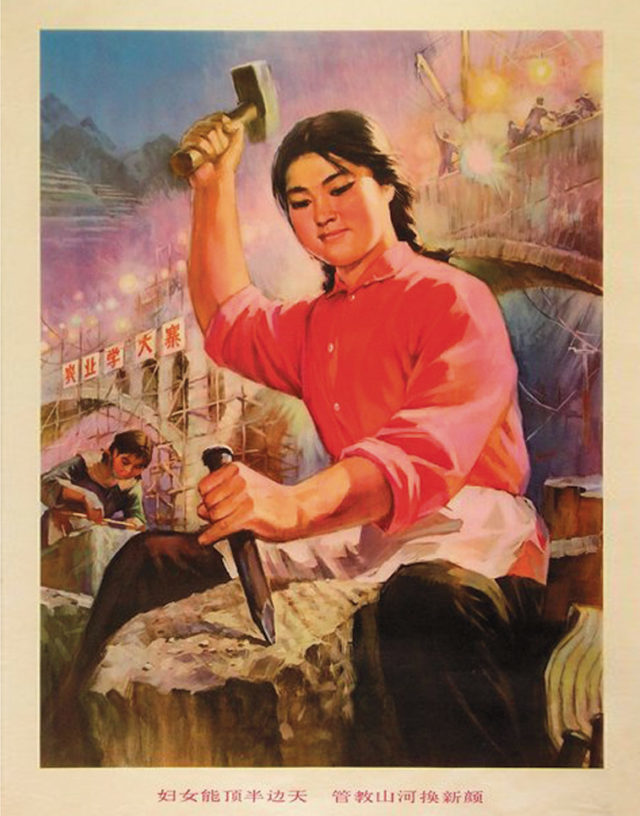Leta Hong Fincher, a former journalist, is a PhD candidate in sociology at Tsinghua University in Beijing who is conducting research on the economic effects of sexism and the changing place of women in Chinese society and author of the book ‘Leftover’ Women: The Resurgence of Gender Inequality in China. The following is a transcript of a brief interview with Hong Fincher conducted by Jeremy Goldkorn in May 2013.
JG: Is Chinese society going backwards when it comes to the treatment of women and what would you say are the major areas where women’s status or conditions are deteriorating?
LHF: There are many, many areas in which women’s status is moving backwards. I will start with my own research. I found that women have been shut out of arguably the biggest accumulation of real estate wealth in history. In the past decade and a half, since the privatisation of housing and the real estate boom in China, China has created over US$27 trillion in residential real estate wealth. Most of that wealth is in men’s names. Parents tend to buy homes for sons and not for daughters. A lot has been written about the pressure on men to provide a home upon marriage, but what I found is the pressure is equally intense on women and so there are a lot of women who transfer their life savings and all of their assets over to the man – and it may not even be the husband, it may just be a boyfriend – in order to finance the purchase of this extremely valuable home.
So what you are seeing is the creation of this gigantic gender wealth gap, and the consequences of this gender wealth inequality could last for generations, because there is no tax on property and there is no gift tax imposed on parents buying homes for their children. So that’s one major area of economic inequality between women and men.
There has been a lot of research on other areas. The gender income gap is widening, and labour force participation among women is declining sharply, particularly in the cities. There has also been this law that was amended by China’s Supreme People’s Court in August 2011, a new judicial interpretation of the Marriage Law. Before this, basically marital property was common property, but now essentially whoever buys the home and whose name is on the deed gets to keep the home in the event of a divorce. This is a severe setback to married women’s property rights that has consequences extending far beyond merely who gets the property in the event of a divorce, because whoever has greater wealth in the marriage has a lot more bargaining power in all areas of the marriage.
That relates to another very serious problem for women, which is the pervasiveness of domestic violence. I do not think that we have the evidence to say that domestic violence has necessarily worsened, but it certainly has not gotten any better and there has been no progress whatsoever in introducing a national law that would really prevent and punish perpetrators of domestic violence. This is a very serious problem, especially when it comes to property rights.
There are all sorts of other areas. Human Rights Watch came out with this report recently about the proliferation of prostitution in the last few decades and major abuses of all of these workers in the sex trade.
All of the problems with creation of inequality of wealth and income that relate to all Chinese people hit women especially hard.
Then there’s the campaign against leftover women! In 2007, the Women’s Federation defined the new term, shengnü 剩女 or ‘leftover women’. The Ministry of Education adopted it as part of China’s official lexicon. And ever since then, the state media has been stigmatising urban educated women over the age of twenty-seven who are still single, and so in all the state media you see columns, news reports, supposedly objective social science surveys, cartoons, and TV shows all basically hurling invective at women who choose to pursue higher education and remain single beyond the age of twenty-seven.
What I have found is that this is not merely a cultural phenomenon, it has very drastic economic consequences and relates back to my topic of real estate wealth. Because of the intense pressure on young women to get married, a lot of young women rush into marriage with the wrong man. I find that a lot of times these young women come under such pressure when they’re getting married and buying a home. It can be a very complicated financial transaction. It usually involves the parents of both the bride and the groom, and there can be heated arguments over whose name is going to be registered on the property deed. Time and time again I have found young women who are unwilling to walk away from an unequal financial arrangement because they are so anxious about not finding another husband, and so I think that this ‘leftover women’ campaign has also contributed to the creation of the enormous gender wealth gap.

‘Women hold up half the sky, manage the landscape to give it a new face.’ Mao-era propaganda poster from Liaoning province, April 1975.
Source: Creativesomerset.com
JG: Do you see any remnants of the Maoist ‘women hold up half the sky’ mentality and was that ever even a real thing? Has there been any good news? Has there been any legislation that has benefited women?
LHF: Well, with regards to legislation, there has not been any that I am aware of that has really helped women. I mean it is possible that there might be something out there, but I certainly have not heard of it. The positive news is that women are getting educated: you have record numbers of women getting a college education, and I believe that there may be about twenty-five percent more university educated urban women now than there were in 2000. That is very good news.

Two young women at an Internet cafe: ‘There are no decent men out there.’ The other replies: ‘I will take one if he comes free of charge.’ Cartoon in response to campaign against ‘leftover women’ of the Women’s Federation.
Source: Wshed.blog.sohu.com
But I believe that that is partly the reason why the government rolled out this leftover women campaign. Because women are getting so much more educated, they are choosing to pursue their careers, and naturally when a woman wants to advance her education and advance her career, she wants to delay marriage. So I think this leftover women campaign is in large part a backlash against the recent gains of women in education and in their early careers. And this is related as well to the one-child policy. A lot of scholars have done research showing that as a result of the one-child policy, parents with only one daughter tend to invest a lot in her education, because the daughter does not need to compete with a brother for parental investment. But what you are not seeing is that increased education translating into economic gains when women enter the workforce and particularly when they get married.



